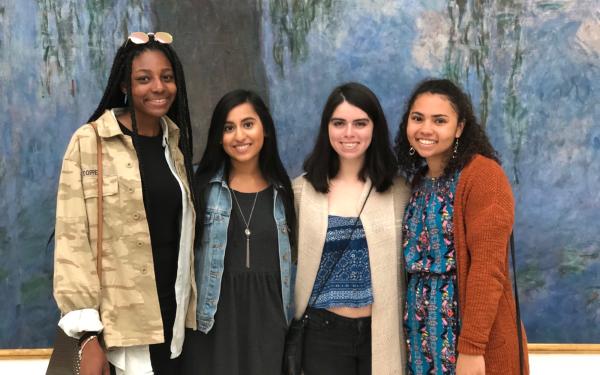Majors
We offer our students the most effective and relevant instruction in French, Francophone, and Italian languages, literatures, and cultures. Our courses provide a wide perspective on Italian and French culture, and include topics such as migration, sex and love, fashion and material culture, modern media, Italian identities, the languages of Italy and food. In addition, the Department offers study abroad opportunities in France, Italy, Quebec, and Senegal as well as internship opportunities in Italy. Our undergraduate majors are designed to maximize students’ ability to understand, speak, read, and write a foreign language and to develop an informed appreciation of its literature(s) and culture(s). Our goal is to develop students’ intercultural competency and guide them to understand the skills that they develop so that they can express to future employers what they have to offer as multilingual, culturally and interculturally competent job candidates. Although no program can be more than what each student chooses to make of it, an undergraduate major in French, Italian, French Studies or Italian Studies will be both an intellectual and a practical enterprise. It will provide the learner with insight into his or her own culture as well as into French, Francophone, and/or Italian cultures, and it can also lead to a variety of career opportunities.
As a field of humanistic learning, language study serves the larger aims of liberal education by producing well-rounded, informed, and tolerant individuals who can excel in a variety of careers. More and more, employers are choosing liberal arts majors over narrowly trained technical specialists, because their superior communication skills give them a distinct advantage in the business and professional worlds. Increasing competition and the development of a global economy have combined to make the foreign language major more attractive than ever. In addition to business, there are also career opportunities in education, law, government, international relations, and many other fields. There is a national shortage of people who have experience with world languages, despite the need in the emerging global economy. Now is the time to study a world language. The Department encourages students to consider a double major, combining French or Italian with another discipline. The Arts and Sciences Career Success Office distributes an information packet on Careers in Foreign Languages and has qualified personnel who can help in job placement. For more details on this subject, students should also consult the Center for Foreign Languages, Literatures, and Cultures in 100 Hagerty Hall, and are encouraged to visit the CLLC careers in Foreign Languages website, 292-4361. To see what recent undergraduate alumni in French and Italian are doing with their degrees, read Thoughts from our Alumni.
It is not necessary to have made a firm decision to major in French, Italian, or Italian Studies in order to consider the program and even to enroll provisionally in it. All programs require careful planning, and the sooner students begin to think about one in an organized manner, the more likely they will be to master the subject. For this reason, students interested in a major are encouraged to explore it as early as possible, preferably during the first or second year, but certainly no later than the beginning of the junior year.
Entry into the Department of French and Italian in the College of Arts and Sciences (ASC) can be through direct enrollment for any new first-semester freshman whose primary interest is in French or Italian or by transfer from another college. Although it is possible to delay entry up to 60 hours, no student should wait beyond 50 hours of earned credit. Once a student is enrolled through ASC as a French or Italian major, the department will assign a faculty advisor to him or her. The student can find out from FRIT’s Academic Program Coordinator, who his or her faculty advisor is and should schedule an appointment with that faculty advisor to discuss curriculum and goals. Non-honors FRIT majors will also be assigned to the ASC advisor who works directly with FRIT, Dr. Andy Spencer (spencer.4@osu.edu, Hagerty 355). (Honors students will continue to work with an advisor in the ASC Honors Program office in 3180 Smith Lab). Non-honors students transferring from another college should meet with Dr. Spencer in Hagerty 355 in order to complete the transfer and declare the French or Italian major. Dr. Spencer will be able to help students fulfill both major and GE degree requirements, drop or add courses, change or add minors and majors, and make other administrative adjustments to their curriculum. Faculty advisors can help students devise research projects, set academic and professional goals, acquire information on graduate programs, and generally gain some of the knowledge and tools they need to be successful at Ohio State and beyond.
Please note that it is extremely important that new non-honors students declare their French, Italian or Italian Studies major with Dr. Spencer in Hagerty 355 in order to be included on the departmental list and to have a faculty advisor assigned to them. Double majors should also inform him of their second major at that time. Students who do not appear in person in Hagerty 355 to be assigned a faculty advisor will not be officially registered as majors. It should be noted that the faculty advisor is charged with the major program only. Students with questions concerning other degree requirements should consult Dr. Spencer or another ASC advisor if they are a double major.
The major program is a list of all the courses that constitute the student's major field of study and is a final contract of graduation. It is entered on a Major Program Form that is filled out in consultation with the major advisor (Andy Spencer, Spencer.4) and filed with ASC. As soon as a student's major program can be determined, and certainly no later than the junior year, a Major Program Form should be completed and filed. Any subsequent changes in the program should be discussed with the major advisor and indicated on a Revision of Major Form. It is important for students to stay in touch with their major advisor through regular consultations, preferably once every semester, but at least once a year.
A course in which a student receives a grade lower than C- cannot be counted toward the major. A student who receives such a grade must notify his or her major advisor in order to determine whether to repeat the course or choose a substitute. The credit hours for a repeated course shall in no case be counted more than once in meeting graduation requirements. When a student repeats a course, both grades appear on the student's record and both are used in computing the point-hour ratio.
Students can review FRIT major & minor courses through our website.






